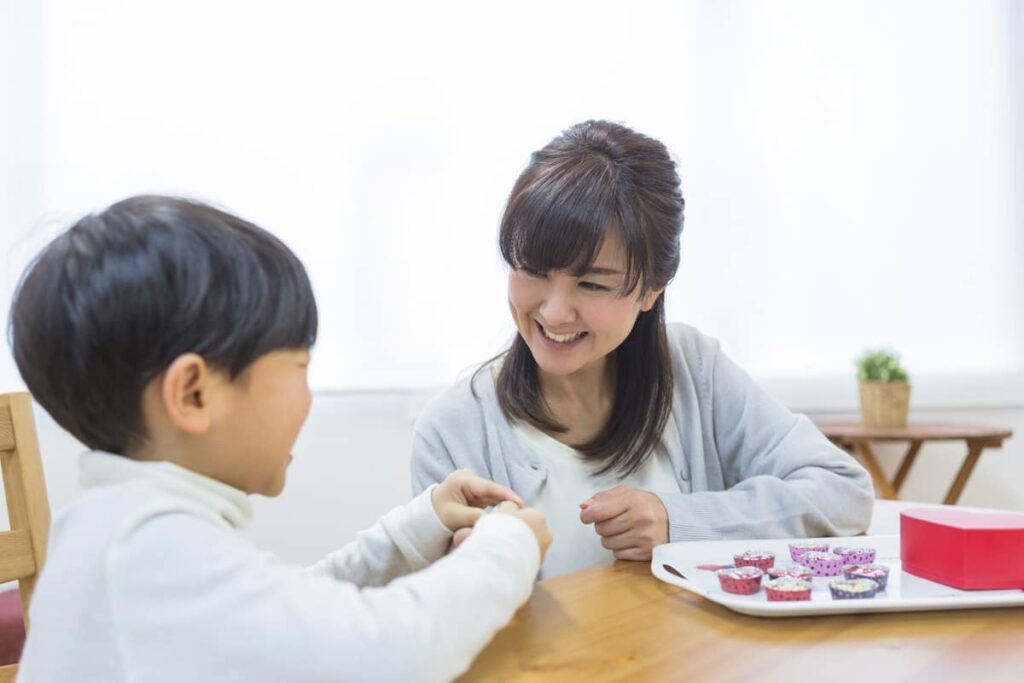[ad_1]
90% of moms said they gift Valentine’s Day chocolates to their sons, ranging from preschool to post-graduate ages, out of fear that no girl will. Read more about Valentines in Japan from three surveys asking moms, their sons, and girls about their experiences.
90% of moms install a countermeasure of Valentine’s Day depression
Valentine’s Day has Japanese boys and men on edge. And their moms. Unlike Western societies, in Japan, it’s customary for girls/women to gift chocolates to boys/men on Feb. 14th. (White Day is when the order’s reversed.)
Naturally, male anticipation reeks in every classroom and office. Will I get chocolate today? Surprisingly, moms with sons are just as nervous.
90% of moms gift their sons chocolate out of fear that nobody else will.
Moms with the longest record of giving these “pity chocolates” to their sons do so from their sons’ elementary years to post-university years. The majority stopped making the gesture by the time their sons entered elementary school.


Do they have no faith? The answer is: No. No, they do not. 41.5% say they do not expect their sons to receive chocolates while 30% said they do.
The most common cutoff age for sons receiving Valentine’s Day chocolate from girls was before they entered elementary school. A small minority are recipients even in their post-university years.
Advertisements
70 out of the 200 moms surveyed said their sons have never received Valentine’s Day chocolates from girls, making them feel “hopeless and indifferent to becoming popular.”
Well, what are their sons saying?
More than 40% of moms say their sons have no expectations of getting Valentine’s Day chocolates from girls, saying “School rules ban it anyways,” and that they “can’t be bothered to return the favor.”
Less than 20% of moms said they noticed their sons acting unusual on Valentine’s Day, such as worrying about their outfits and “talking from the day before about whether they can recieve [chocolates] or not.”
The approx. 10% who don’t gifted ‘pity chocolates’ to their sons are either uninterested in Valentine’s Day or the prospect of taking extra measures to spare their sons’ ego.
One mom said, “I personally do not have a habit of giving [chocolates] to my husband and coworkers. And I also buy chocolate in moderation [for my son] whenever he asks for it even when it’s not Valentine’s Day.”
“I don’t see the point in parents giving [chocolates to their sons],” said another.
Moms with sons who have received Valentine’s Day chocolates share a mix of emotions: relief, happiness, and jealousy. Here are some of their comments from the report:



Moms whose sons did not receive any chocolates express their own hopelessness.
“I’ve given up. [My son] doesn’t have to be popular.”
“Nowadays [kids] aren’t allowed to bring chocolates to school, so it is what it is.”
One mother was getting strategic.
“Maybe I’ll teach him techniques to make him popular among girls.”
This survey was conducted by Kajinabi, operated by digital marketing company PLAN-B. The company provides information on household maintenance and surveys readers on a wide range of topics: ways to spend the new year, how much to spend on cleaning supplies, and more.
The Valentine’s Day underground trade in Japanese schools
Japanese schools are notoriously known for strict rules such as banning the use of sunscreen because it is ‘borderline makeup.’
Another item on most schools’ banned list of items is snacks, including Valentine’s Day chocolates.
There are a few rare schools that prohibit chocolates on the surface while turning a blind eye. Most will conduct luggage checks to weed out any rule-breaking smugglers, a former school teacher said.
That is why students get creative and hide chocolates in shoe boxes and classroom drawers. If caught, teachers confiscate the girls’ commonly handmade chocolates. But if the handoff goes undetected, boys make their moms proud at best – and jealous at worst – when they bring home their Valentine’s Day gifts.
Japanese men’s fantasy Valentine gifters
When it’s hard getting Valentine’s Day chocolates from girls in real life, maybe men use that extra time to think about which celebrities would be ideal to receive the favor from.
“Which actress would you like to receive Valentine’s Day chocolates from?”
Weekly tabloid magazine Smart Flash surveyed 500 men in their 30s, asking this exact question. Here are the top two women with outstanding votes.
#1 with 94 votes: Kanna Hashimoto, age 25
She gained national attention in 2013 while belonging to a girls’ idol group DVL. Since then she has moved on to acting with a track record of 29 films. Her most popular film is said to be the 2019 “Kaguya-sama: Love Is War.”
#2 with 79 votes: Mei Nagano, age 24
She is an actress and model who gained popularity in 2015 by starring in the romcom “My Love Story!!”
Women are buying themselves chocolate
Research company Intage found that 21.7% of women are buying themselves chocolate for Valentine’s Day.
In addition, 80% of women say they do not want to participate in giri-choco (義理チョコ), a type of Valentine’s Day chocolate that girls/women give to boys/men out of obligation. It’s a non-romantic gesture that sends the message: well, it’s Valentine’s Day so here’s some chocolate anyways since you’re my classmate, colleague, friend, etc.
Sources
[1] バレンタインは母親も嬉しい!?息子が異性からバレンタインをもらったら「嫉妬」「悲しい」など複雑な心情も【母親200人にアンケート】. PR TIMES
[2] 学校でバレンタインが禁止の理由は?チョコは隠しておけばバレない?【元教師が解説】. Yahoo!ニュースJAPAN
[3] 「30代男性がバレンタインチョコをもらいたい20代女優」ランキング 広瀬すず、永野芽郁を迎えた1位は?【500人に聞いた】. FLASH
[4]【恋愛】バレンタインに告白した経験「ない」女性が9割近く…男性はどう思ってる?婚活男女1200人調査で明らかに. otoanswer
[5] 2024年バレンタインは「自分チョコ」が大幅に増加し2割に 義理チョコ「参加したくない」は8割超え. FNNプライムオンライン
[ad_2]
Source link



